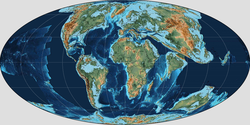Mealla Formation
The Mealla Formation is a geological formation of the Santa Bárbara Subgroup, part of the Salta Group in the Salta Basin in northwestern Argentina whose strata date back to the Middle to Late Paleocene of the Paleogene.
| Mealla Formation Stratigraphic range: Mid-Late Paleocene (Peligran-Riochican) ~59–56 Ma | |
|---|---|
| Type | Geological formation |
| Unit of | Salta Group Santa Bárbara Subgroup |
| Underlies | Maíz Gordo Formation |
| Overlies | Yacoraite Formation |
| Thickness | 100–150 m (330–490 ft) |
| Lithology | |
| Primary | Sandstone, siltstone |
| Other | Conglomerate, paleosols |
| Location | |
| Coordinates | 23.1°S 65.6°W |
| Approximate paleocoordinates | 25.9°S 53.8°W |
| Region | Jujuy Province |
| Country | |
| Extent | Salta Basin |
 Mealla Formation (Argentina) | |
Description

The Mealla Formation comprises sandstones ranging upward to siltstones with a basal conglomerate bed. The formation unconformably overlies the Yacoraite Formation and is overlain by the Thanetian Maíz Gordo Formation. The thickness of the formation ranges from 100 to 150 metres (330 to 490 ft).[1] The formation is the lowermost unit in the Santa Bárbara Subgroup, representing the post-rift phase of the Salta Basin. The Mealla Formation was deposited in a fluvial environment.[2] Other parts of the formation contain freshwater stromatolites, interpreted as deposited in a shallow lacustrine environment.[3]
The basal conglomerate is 3.5 metres (11 ft) thick, matrix-supported with 80% of the clasts coming from quartzites from the Cambrian Mesón Group, with the remainder of the clasts provenanced by the Precambrian Puncoviscana Formation and the quartzarenites of the Santa Victoria Group. The conglomeratic section also contains paleosols.[2] The pollen analysis performed by Quattrocchio et al. in 1997 indicated a phase of higher aridity during the deposition of the Mealla Formation.[4]
The formation was initially described as Riochican, and later as Itaboraian, but after the redefinition of the Itaboraí Formation to Early Eocene, the Mealla Formation is Peligran to Riochican in age. The Mealla Formation is correlated with the Río Loro Formation that crops out in the Sierras Pampeanas to the southeast of the Salta Basin.
Fossil content
The following fossils were reported from the formation:[5]
- Mammals
- Reptiles
- Pollen
- Aquifoliaceae
- Gemmatricolpites subsphaericus[7]
- Haloragaceae
- Myriophyllumpollenites sp.[8]
- Oenotheraceae
- Corsinipollenites menendezii[9]
- Pandanaceae
- Pandaniidites texus[8]
- Salicaceae
- Rousea patagonica[10]
- Ulmaceae (Phyllostylon)
- Verrustephanoporites simplex[11]
- Aquifoliaceae
References
- Narváez, 2009, p.22
- Sánchez & Marquillas, 2009, p.389
- Narváez, 2009, p.23
- Narváez, 2009, p.172
- Mealla Formation at Fossilworks.org
- Pascual et al., 1978
- Narváez, 2009, p.134
- Narváez, 2009, p.109
- Narváez, 2009, p.108
- Narváez, 2009, p.171
- Narváez, 2009, p.115
Bibliography
- Narváez, Paula Liliana. 2009. Palinoestratigrafía, paleoambientes y cambios climáticos durante el Cretácico final y Paleógeno de la Cuenca del Grupo Salta, República Argentina (PhD thesis), 1–229. Universidad Nacional de Salta. Accessed 2020-06-13.
- Sánchez, María Cristina, and Rosa A. Marquillas. 2010. Facies y ambientes del Grupo Salta (Cretácico-Paleógeno) en Tumbaya, Quebrada de Humahuaca, Provincia de Jujuy. Revista de la Asociación Geológica Argentina 67. 383–391. Accessed 2020-06-13.
- Quattrocchio, M.E.; W. Volkheimer, and C. del Papa. 1997. Palynology and paleoenvironment of the “Faja Gris” Mealla Formation (Salta Group) at Garabatal creek (NW Argentina). Palynology 21. 231-247.
- Pascual, R.; M.G. Vucetich, and J. Fernández. 1978. Los primeros mamiferos (notoungulata, henricosborniidae) de la Formacion Mealla (Grupo Salta, subgrupo Santa Barbara) : sus implicancias filogeneticas, taxonomicas y cronologicas. Ameghiniana 15. 366-390.